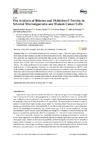Identificador persistente para citar o vincular este elemento:
https://accedacris.ulpgc.es/jspui/handle/10553/70083
| Campo DC | Valor | idioma |
|---|---|---|
| dc.contributor.author | Jabłońska-Trypuć, Agata | en_US |
| dc.contributor.author | Wydro, Urszula | en_US |
| dc.contributor.author | Serra-Majem, Lluis | en_US |
| dc.contributor.author | Wołejko, Elżbieta | en_US |
| dc.contributor.author | Butarewicz, Andrzej | en_US |
| dc.date.accessioned | 2020-02-05T12:52:18Z | - |
| dc.date.available | 2020-02-05T12:52:18Z | - |
| dc.date.issued | 2019 | en_US |
| dc.identifier.issn | 1661-7827 | en_US |
| dc.identifier.other | Scopus | - |
| dc.identifier.other | WoS | - |
| dc.identifier.uri | https://accedacris.ulpgc.es/handle/10553/70083 | - |
| dc.description.abstract | Bifenox and Dichlobenil belong to the commonly used in Poland in agriculture group of herbicides and their residues are often detected in the environment. They are poorly known regarding their possible carcinogenic and antibacterial effect at the cellular level. Therefore, we decided to study their activity in bacterial strains Aliivibrio fisheri, E. coli, P. aeruginosa, and C. albicans (yeast) and human cancer ZR-75-1 cells. Compounds under study exhibit stimulatory effect on analyzed bacterial strains. The study performed on mammalian cells better reflects the influence of environmental pollutants on human organism, therefore we evaluated the effect of herbicides on ZR-75-1 cells. Cells viability, apoptosis and selected oxidative stress parameters in ZR-75-1 cells were investigated. Both analyzed substances exhibit stimulatory effects on analyzed parameters, however they do not stimulate apoptosis which correlate positively with the induction of oxidative stress. Bifenox and Dichlobenil enhance oxidative stress parameters by the generation of high levels of ROS, which can lead to their adaptation and resistance to the standard treatment regimen. | en_US |
| dc.language | eng | en_US |
| dc.relation.ispartof | International Journal of Environmental Research and Public Health | en_US |
| dc.source | International Journal Of Environmental Research And Public Health [ISSN 1661-7827], v. 16 (21), (Noviembre 2019) | en_US |
| dc.subject | 32 Ciencias médicas | en_US |
| dc.subject.other | Bacteria | en_US |
| dc.subject.other | Fungi | en_US |
| dc.subject.other | Herbicides | en_US |
| dc.subject.other | Zr-75-1 Cells | en_US |
| dc.title | The analysis of bifenox and dichlobenil toxicity in selected microorganisms and human cancer cells | en_US |
| dc.type | info:eu-repo/semantics/article | en_US |
| dc.type | Article | en_US |
| dc.identifier.doi | 10.3390/ijerph16214137 | en_US |
| dc.identifier.scopus | 85074364585 | - |
| dc.identifier.isi | 000498842000083 | - |
| dc.contributor.authorscopusid | 36113938100 | - |
| dc.contributor.authorscopusid | 55798276900 | - |
| dc.contributor.authorscopusid | 35596972100 | - |
| dc.contributor.authorscopusid | 55798819300 | - |
| dc.contributor.authorscopusid | 12765715400 | - |
| dc.identifier.eissn | 1660-4601 | - |
| dc.identifier.issue | 21 | - |
| dc.relation.volume | 16 | en_US |
| dc.investigacion | Ciencias de la Salud | en_US |
| dc.type2 | Artículo | en_US |
| dc.contributor.daisngid | 31261913 | - |
| dc.contributor.daisngid | 3069247 | - |
| dc.contributor.daisngid | 31465462 | - |
| dc.contributor.daisngid | 30934038 | - |
| dc.contributor.daisngid | 2957827 | - |
| dc.description.numberofpages | 19 | en_US |
| dc.utils.revision | Sí | en_US |
| dc.contributor.wosstandard | WOS:Jablonska-Trypuc, A | - |
| dc.contributor.wosstandard | WOS:Wydro, U | - |
| dc.contributor.wosstandard | WOS:Serra-Majem, L | - |
| dc.contributor.wosstandard | WOS:Wolejko, E | - |
| dc.contributor.wosstandard | WOS:Butarewicz, A | - |
| dc.date.coverdate | Noviembre 2019 | en_US |
| dc.identifier.ulpgc | Sí | es |
| dc.description.sjr | 0,739 | |
| dc.description.jcr | 2849,0 | |
| dc.description.sjrq | Q2 | |
| dc.description.jcrq | Q1 | |
| dc.description.scie | SCIE | |
| dc.description.ssci | SSCI | |
| item.fulltext | Con texto completo | - |
| item.grantfulltext | open | - |
| crisitem.author.dept | GIR IUIBS: Nutrición | - |
| crisitem.author.dept | IU de Investigaciones Biomédicas y Sanitarias | - |
| crisitem.author.dept | Departamento de Ciencias Clínicas | - |
| crisitem.author.orcid | 0000-0002-9658-9061 | - |
| crisitem.author.parentorg | IU de Investigaciones Biomédicas y Sanitarias | - |
| crisitem.author.fullName | Serra Majem, Luis | - |
| Colección: | Artículos | |
Citas SCOPUSTM
18
actualizado el 08-jun-2025
Citas de WEB OF SCIENCETM
Citations
19
actualizado el 12-ene-2026
Visitas
56
actualizado el 11-ene-2026
Descargas
62
actualizado el 11-ene-2026
Google ScholarTM
Verifica
Altmetric
Comparte
Exporta metadatos
Los elementos en ULPGC accedaCRIS están protegidos por derechos de autor con todos los derechos reservados, a menos que se indique lo contrario.
